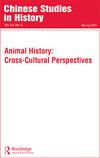“Running counter to what contemporaries valued”—The intellectual shift of Liu Boming of the May Fourth period
IF 0.2
4区 历史学
0 ASIAN STUDIES
引用次数: 0
Abstract
Abstract “May Fourth” was a historical period of transitions, from individualism to socialism, and from “new youth” to “progressive youth.” Instructors and students at Peking University were leaders of these trends. In contrast with Peking University, Liu Boming 劉伯明, a leader at Nanjing Higher Normal School-National Southeastern University, experienced an intellectual shift “running counter to what contemporaries valued.” Soon after the May Fourth incident, Liu Boming supported and guided his students to establish social consciousness and concern for social affairs; however, starting in 1920, sensitive to the unexpected changes taking place among students and within intellectual circles, Liu Boming turned toward advocacy of spiritual development, focusing on creating a simple, reserved academic atmosphere at Nanjing Higher Normal School-National Southeastern University. Although Liu Boming’s ideas and practices could not change the direction in which trends were moving in that period, they represented another side of May Fourth, reflecting the complexity of society and culture during the May Fourth period.“与当代人的价值观背道而驰”——五四时期刘伯明的思想转向
“五四”是一个从个人主义向社会主义、从“新青年”向“进步青年”过渡的历史时期。北京大学的教师和学生是这些趋势的领导者。与北京大学形成鲜明对比的是,南京高师-国立东南大学校长刘伯明经历了一场“与同时代人的价值观背道而驰”的思想转变。“五四”事变后不久,刘伯明支持和引导学生树立社会意识,关注社会事务;然而,从1920年开始,刘伯明对学生和知识界发生的意想不到的变化感到敏感,转而倡导精神发展,在南京高师-东南大学注重营造一种简单、含蓄的学术氛围。刘伯明的思想和实践虽然不能改变当时思潮的走向,但却代表了五四的另一面,反映了五四时期社会文化的复杂性。
本文章由计算机程序翻译,如有差异,请以英文原文为准。
求助全文
约1分钟内获得全文
求助全文
来源期刊

CHINESE STUDIES IN HISTORY
Multiple-
CiteScore
0.20
自引率
0.00%
发文量
5
期刊介绍:
Chinese Studies in History makes noteworthy works and important trends of historical study in the Chinese-speaking world available to English-language readers. Thematic issues present original papers or articles from academic journals and anthologies that have been selected for translation because of their excellence, interest, and contribution to scholarship on the topic. Topical coverage ranges over all periods and subfields of Chinese and East Asian history as well as more general theoretical and historiographical questions of interest to historians of many specialties. Each issue includes a substantive introduction by the editor or specialist guest editor.
 求助内容:
求助内容: 应助结果提醒方式:
应助结果提醒方式:


